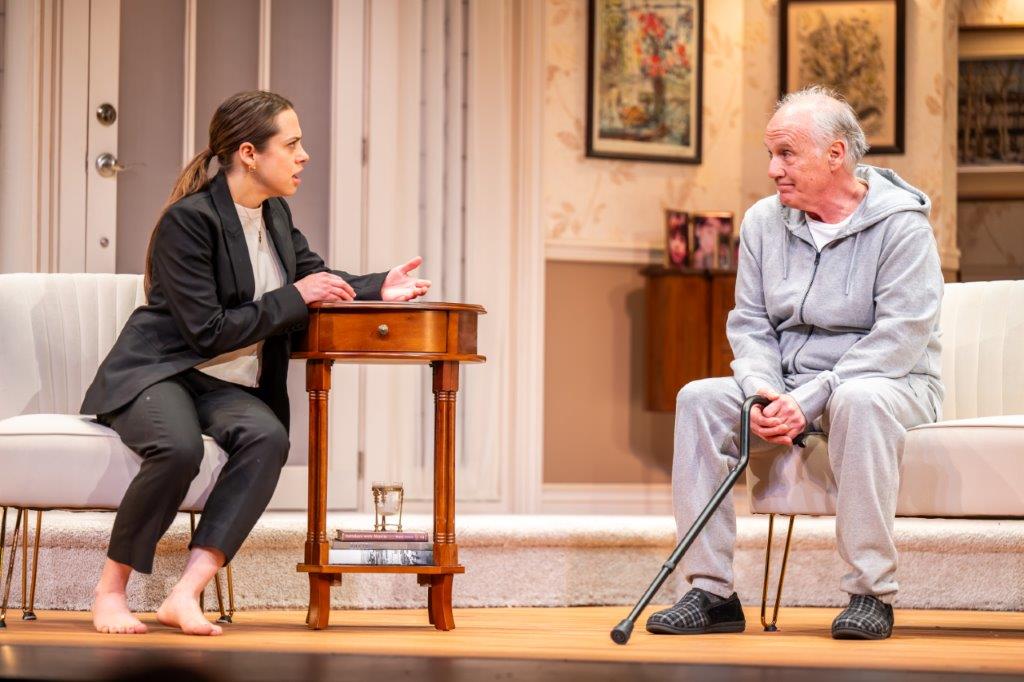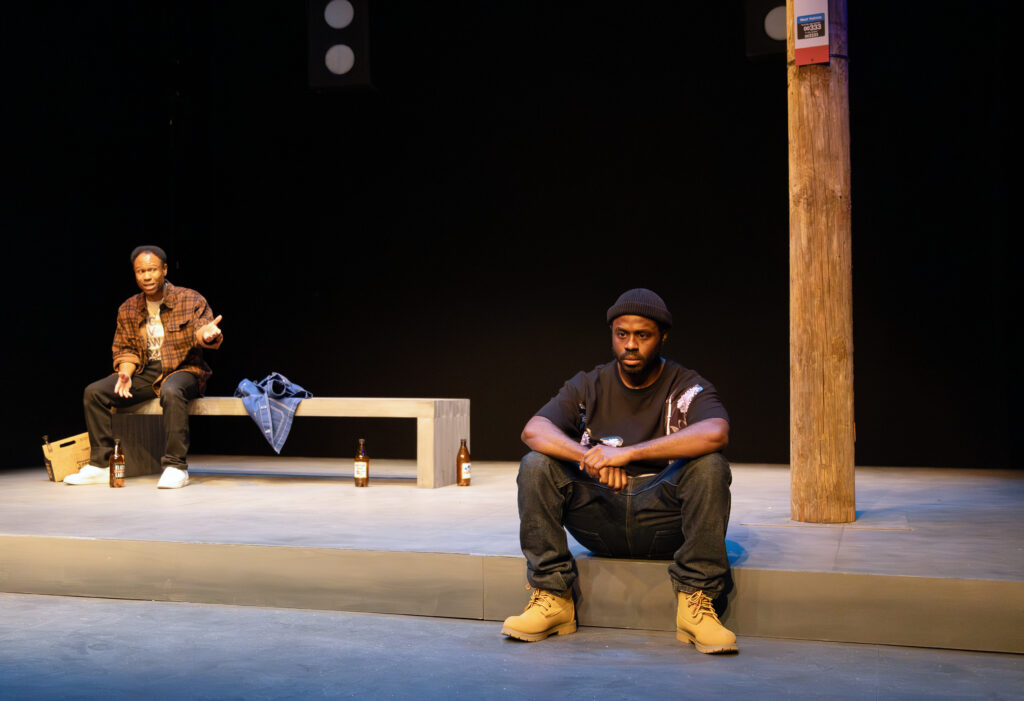
Harold Green Jewish Theatre & Grand Theatre/In Seven Days by Jordi Mand, directed by Philip Akin, Greenwin Theatre, Meridian Arts Centre, closes May 16, 2024.

Jordi Mand’s In Seven Days is a very courageous play because it tackles MAID, Canada’s version of dying with dignity.
Presumably, the play is set in a small city in Ontario. Rachel (Shaina Silver-Baird), a busy 30 something lawyer, has driven up from the big city for the weekend to visit her elderly and ailing father Sam (Ron Lea), who lives with his much younger girlfriend Shelley (Mairi Babb). The other two characters we meet along the way are Rabbi Eli (Ralph Small), a long-time friend of Sam’s, and Rachel’s ex-boyfriend Darren (Brendan McMurtry-Howlett).
Rachel finds out very quickly about her father’s decision to employ assisted suicide when Shelley tells her that she better inform her work that she will be away longer than a weekend. What follows is a frantic effort on Rachel’s part to change Sam’s mind. Similarly, Rabbi Eli, too, has to cope with Sam’s decision, because Sam wants him there at his death. The Rabbi has one of the great lines in the play, namely, “Jews don’t do that!” As for Shelley, she has accepted her lover’s decision. Darren, who arrives late in the play, is there to support Rachel.
The movement of the play is progress through the next seven days. Mand manages to fit in a lot of arguments both pro and con about assisted suicide, as the conversations rage. She has even managed to make the play quite funny, so all is not doom and gloom. There are quite amusing moments around poppyseed bagels and bridesmaid’s dresses, for example. Mand has also layered the play with conflicting relationships such as Rachel and Shelley, Rachel and Darren, and Sam and Darren.
Nonetheless, there is no getting around the central focus – a person’s decision to die with dignity at the time of their own choosing, and Mand does a wonderful job in presenting elevated arguments on both sides. The key moment comes with Rabbi Eli relating a conversation he had with his mentor, whom he had phoned about his dilemma. His mentor has asked him if his friend is suffering – and suffering is at the hub of the issue.
Director Philip Akin, one of the best in the country, once again manipulates his forces with skill There are also strong performances, particularly from Lea and Silver-Baird. Sean Mulcahy’s beautiful living room/kitchen set also holds a few surprises. Siobhan Sleath’s lighting lingers on single faces as scenes changes, while sound designer Lyon Smith has covered those changes with appropriate music.
All in all, this production of In Seven Days is a class act on every level. It is poignant, heartfelt and very troubling, while placing an extremely important issue on the stage.

Pleiades Theatre/Tyson’s Song by Peter N. Bailey, directed by Ash Knight, Factory Studio Theatre, closes May 19, 2024.

Before Tyson’s Song began, Ash Knight, Pleiades’ artistic executive director, told the audience that a new focus for the company would be sharing stories of first and second generation Canadians, thus setting the stage for veteran actor Peter N. Bailey’s first play.
Two Black men are at an isolated bus stop somewhere in the suburbs nursing a six pack of beer. It is very late at night and they have just come from a party. This evening is supposed to be a good-bye celebration for Bryan (Jamar Adams-Thompson) and Tyson (Kyle Brown), because Bryan is leaving for Vancouver the next day.
Designer Anahita Dehbonehie has given us a TTC bus stop designated by a realistic sign on a pole, a waiting bench, and a curb. In this spare setting, these two long-time friends have all the time in the world to talk as they wait for the all-night bus that never seems to come. What does pass by, from time to time, is a police car, which makes the two men stand rigid with tension. Thus it is to be Black man in Toronto late at night.
Bryan seems to have made something of his life. Although he has a wondering eye, (he flirted at the party), he is married to Nathalie and the couple have a daughter called Essie, and he is, we assume, employed. Why he is moving to Vancouver we do not know, but he has enough contacts in town to have secured several jobs for Tyson, all of which the latter has lost. The bitter Tyson, on the other hand, deems himself a loser. He has been in prison, why we don’t know, but he has a trigger temper which points to a reason. Clearly terrible sexual things happened to him there that he flatly denies.
In this bus stop conversation, hurts come to the fore. Bryan took Tyson to the party knowing there was a girl there Tyson had problems with. Bryan never came to visit Tyson in prison. In fact, Tyson’s song is a litany of hurts, beginning with a dodgy childhood, and ending with his best friend, or should I say keeper/minder, leaving the city. It is also clear that Bryan is very worried whether Tyson is going to be all right after he goes.
Bryan is not without his problems. He is in constant phone contact with his wife, who is wondering where he is. As well, he seems to have had problems adjusting to married life. It also comes out that he had a dream of becoming a graphic artist, and was actually accepted into a program, but didn’t tell his wife. Does this mean that cocky Bryan has self-doubts? We also hear about toxic masculinity in the Black community when Bryan tells the story of his father criticizing him for braiding his daughter’s hair.
The banter between the two goes through many phases. On one hand, they have a fierce competition of a game involving bible verses which is very amusing. At other times, hurtful finger pointing looms large. What is very clear is how difficult it is for a Black man to show vulnerability.
Brown’s Tyson is a coiled spring ready to pounce. He seems incapable of being happy, of seeing any good in the world, and the actor beautifully radiates a damaged soul. We understand his Tyson perfectly. Adams-Thompson’s Bryan, on the other hand, is a hail and farewell kind of guy, who lives his life on the sunny side. In comparison with Tyson, Bryan seems to have succeeded in finding a place for himself. Nonetheless, playwright Bailey’s subtext in the play seems to indicate how very difficult it is to be a Black man in Toronto.
Ash Knight’s direction is excellent in its pacing, while Dave Degrow has provided the clever lighting, augmented by Stephon Smith’s atmospheric sound design.
For a first time playwright, Bailey has created two very strong characters, and while Tyson’s Song isn’t perfect, suffering from too many unanswered questions, it does make us look forward to another work from this talented actor.

